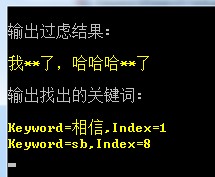在本人昨晚发的强大灵活的脏字过虑:1万字文章过虑1万关键词用时只要1毫秒(包括扩展的高亮功能) 文章中,只是介绍过虑的功能和性能,这个文章主要讲一下实现的思路,另外给大家看一下Aho–Corasick算法的C#实现。
既然是要过虑,那就要先查找,如果是直接的一个字符一个字符的匹配,那是很耗时的,因为时间花在不需要匹配的工作,有不少人会用正则去解决过虑,我09年的时候也这样,但后来发现大量关键词下性能确实极低下,所以才会另想它法。上一文中的过虑主要思想是这样的,开始会先用一个字典保存保存所有关键词,同一个字母开头的会另放在一个子字典里,这样一来,扫描的范围就大大的缩小了,然后再考虑到脏字一般是2个字的占了很大的比例,所以再在第二个字母做判断,如果不存在就不需要再扫描下去了,至于可跳字符,就是在直接需要扫描的时候一一判断的,没技巧可讲,另外一点值得注意的是,大小写敏感的情况下,在判断时需要转换大小写,大量关键词影响不小,所以就初始化时再保存了一分小写的,所以在扫描的时候就不需要转换了,所以是否大小写的两个情况性能上不会有什么变化,基本的思路就这样了。如果说,你想要很准确的过虑,那就要用到分词了(判断可以人性化),我的方法只能处理比较简单匹配与过虑。实现过程并没有使用Aho–Corasick算法。
在查找资料的时候还了解到Aho–Corasick算法,它可以帮助我们快速的找出多个子字符串。可以到这里了解算法:http://en.wikipedia.org/wiki/Aho%E2%80%93Corasick_string_matching_algorithm
5点有约会,先直接上实现代码了(从一老外的例子里小改的),本人测试过我上面的方法和使用Aho–Corasick过虑用的时候差不了多少:
/// <summary>
/// 表示一个查找结果
/// </summary>
public struct KeywordSearchResult
{
private int index;
private string keyword;
public static readonly KeywordSearchResult Empty = new KeywordSearchResult(-1, string.Empty);
public KeywordSearchResult(int index, string keyword)
{
this.index = index;
this.keyword = keyword;
}
/// <summary>
/// 位置
/// </summary>
public int Index
{
get { return index; }
}
/// <summary>
/// 关键词
/// </summary>
public string Keyword
{
get { return keyword; }
}
}
/// <summary>
/// Aho-Corasick算法实现
/// </summary>
public class KeywordSearch
{
/// <summary>
/// 构造节点
/// </summary>
private class Node
{
private Dictionary<char, Node> transDict;
public Node(char c, Node parent)
{
this.Char = c;
this.Parent = parent;
this.Transitions = new List<Node>();
this.Results = new List<string>();
this.transDict = new Dictionary<char, Node>();
}
public char Char
{
get;
private set;
}
public Node Parent
{
get;
private set;
}
public Node Failure
{
get;
set;
}
public List<Node> Transitions
{
get;
private set;
}
public List<string> Results
{
get;
private set;
}
public void AddResult(string result)
{
if (!Results.Contains(result))
{
Results.Add(result);
}
}
public void AddTransition(Node node)
{
this.transDict.Add(node.Char, node);
this.Transitions = this.transDict.Values.ToList();
}
public Node GetTransition(char c)
{
Node node;
if (this.transDict.TryGetValue(c, out node))
{
return node;
}
return null;
}
public bool ContainsTransition(char c)
{
return GetTransition(c) != null;
}
}
private Node root; // 根节点
private string[] keywords; // 所有关键词
public KeywordSearch(IEnumerable<string> keywords)
{
this.keywords = keywords.ToArray();
this.Initialize();
}
/// <summary>
/// 根据关键词来初始化所有节点
/// </summary>
private void Initialize()
{
this.root = new Node(' ', null);
// 添加模式
foreach (string k in this.keywords)
{
Node n = this.root;
foreach (char c in k)
{
Node temp = null;
foreach (Node tnode in n.Transitions)
{
if (tnode.Char == c)
{
temp = tnode; break;
}
}
if (temp == null)
{
temp = new Node(c, n);
n.AddTransition(temp);
}
n = temp;
}
n.AddResult(k);
}
// 第一层失败指向根节点
List<Node> nodes = new List<Node>();
foreach (Node node in this.root.Transitions)
{
// 失败指向root
node.Failure = this.root;
foreach (Node trans in node.Transitions)
{
nodes.Add(trans);
}
}
// 其它节点 BFS
while (nodes.Count != 0)
{
List<Node> newNodes = new List<Node>();
foreach (Node nd in nodes)
{
Node r = nd.Parent.Failure;
char c = nd.Char;
while (r != null && !r.ContainsTransition(c))
{
r = r.Failure;
}
if (r == null)
{
// 失败指向root
nd.Failure = this.root;
}
else
{
nd.Failure = r.GetTransition(c);
foreach (string result in nd.Failure.Results)
{
nd.AddResult(result);
}
}
foreach (Node child in nd.Transitions)
{
newNodes.Add(child);
}
}
nodes = newNodes;
}
// 根节点的失败指向自己
this.root.Failure = this.root;
}
/// <summary>
/// 找出所有出现过的关键词
/// </summary>
/// <param name="text"></param>
/// <returns></returns>
public List<KeywordSearchResult> FindAllKeywords(string text)
{
List<KeywordSearchResult> list = new List<KeywordSearchResult>();
Node current = this.root;
for (int index = 0; index < text.Length; ++index)
{
Node trans;
do
{
trans = current.GetTransition(text[index]);
if (current == this.root)
break;
if (trans == null)
{
current = current.Failure;
}
} while (trans == null);
if (trans != null)
{
current = trans;
}
foreach (string s in current.Results)
{
list.Add(new KeywordSearchResult(index - s.Length + 1, s));
}
}
return list;
}
/// <summary>
/// 简单地过虑关键词
/// </summary>
/// <param name="text"></param>
/// <returns></returns>
public string FilterKeywords(string text)
{
StringBuilder sb = new StringBuilder();
Node current = this.root;
for (int index = 0; index < text.Length; index++)
{
Node trans;
do
{
trans = current.GetTransition(text[index]);
if (current == this.root)
break;
if (trans == null)
{
current = current.Failure;
}
} while (trans == null);
if (trans != null)
{
current = trans;
}
// 处理字符
if (current.Results.Count > 0)
{
string first = current.Results[0];
sb.Remove(sb.Length - first.Length + 1, first.Length -1);// 把匹配到的替换为**
sb.Append(new string('*', current.Results[0].Length));
}
else
{
sb.Append(text[index]);
}
}
return sb.ToString();
}
}
测试结果:

下载源码:http://files.cnblogs.com/kudy/KeywordSearch.rar




 本文介绍了关键词过滤的基本思路,包括利用字典和大小写敏感性减少扫描范围,以及避免使用正则表达式提高性能。接着引入Aho–Corasick算法,并提供了一个C#实现的示例。最后通过比较两种方法的测试结果,展示了Aho–Corasick算法在过滤大量关键词时的优势。
本文介绍了关键词过滤的基本思路,包括利用字典和大小写敏感性减少扫描范围,以及避免使用正则表达式提高性能。接着引入Aho–Corasick算法,并提供了一个C#实现的示例。最后通过比较两种方法的测试结果,展示了Aho–Corasick算法在过滤大量关键词时的优势。
















 144
144

 被折叠的 条评论
为什么被折叠?
被折叠的 条评论
为什么被折叠?








